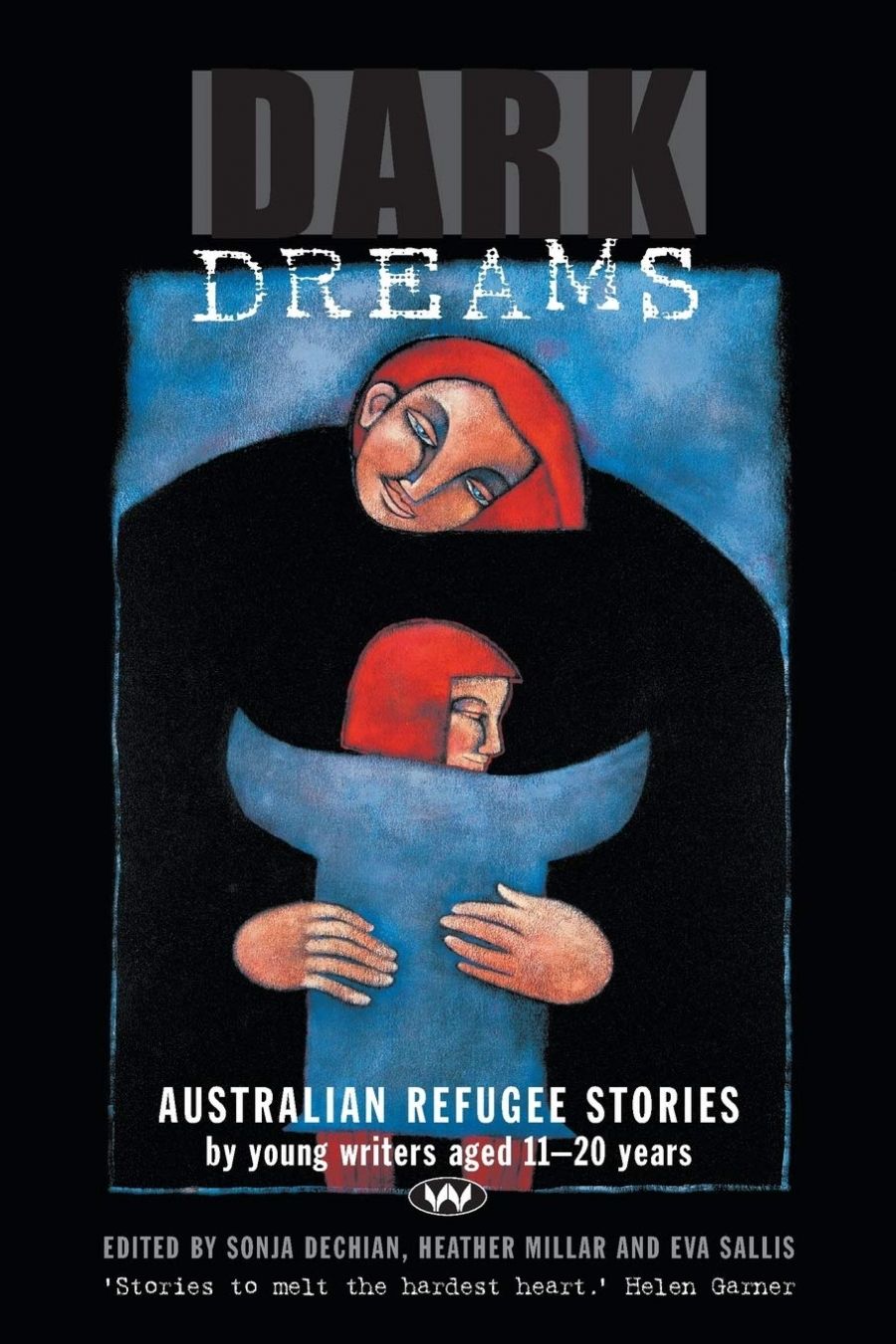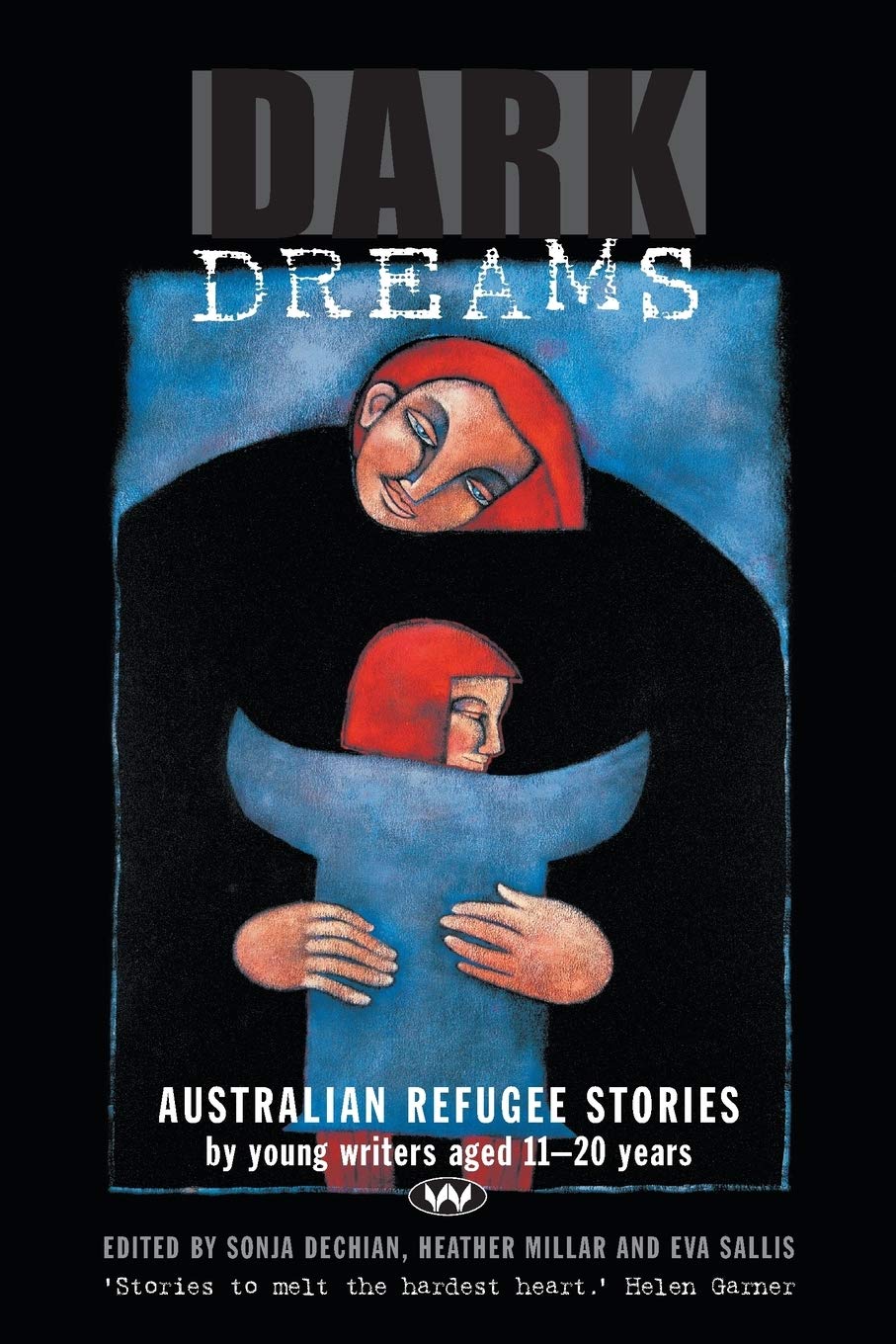
- Free Article: No
- Contents Category: Anthologies
- Review Article: Yes
- Online Only: No
- Custom Highlight Text:
In 2002 Eva Sallis – activist and author of, among others, the 1997 Vogel winner Hiam, – launched ‘Australia IS Refugees’, a writing competition for young people aged between eleven and twenty years old. The competition – a project of the humanitarian organisation Australians against Racism, of which Sallis is present – swiftly gained the support of a wide range of high-profile companies and individuals, many doubtless contributing as a means to show disapproval of this country’s hardline, ethically dubious treatment of refugees.
- Book 1 Title: Dark Dreams
- Book 1 Subtitle: Australian Refugee Stories by young writers aged 11-20 years
- Book 1 Biblio: Wakefield Press, $19.95 pb, 213 pp
- Book 1 Cover Small (400 x 600):

- Book 1 Cover (800 x 1200):

Education unions, teachers’ federations, publishers and generous private individuals funded monetary prizes across senior and junior sections of the competition. The major prize, sponsored by Professor Margaret Reynolds of the United Nations Association of Australia, was a trip to Geneva for the 2003 sitting of the UN. Well-known writers and social commentators volunteered to judge the entries. Amid the many who gave time and effort to the project, special mention should be made of the teachers, librarians and parents whose names are not listed on the acknowledgments page, but whose influential and encouraging presence is felt behind the achievement.
Thirty-seven essays, interviews and personal histories are collected in this anthology, several of them having already been published in small periodicals, and one – eighteen-year-old Hai-Van Nguyen’s harrowing essay, ‘Journey to Freedom’ – abridged in The Age. Nonetheless, the voices in Dark Dreams are ones that are largely unheard in this country. While the rules of entry did not require the writers to be refugees themselves, many of them are and do not have English as a first language. To their credit, the editors have preserved the pieces in a near-original state, correcting spelling and punctuation but leaving in place any factual errors and mismanaged language. The result is a vivid and vital collection, despite the ‘wretched nature of the tales that many of these young people tell. A refugee’s blighted existence – homelessness, landlessness, brutality, constant fear – is tempered by the extraordinary resourcefulness, endurance and optimism that such horrendous conditions can produce. ‘I don’t have any good memory of my childhood,’ writes a fifteen-year-old Afghan girl, and her ongoing distress is painfully clear; yet she is able to hope for a good future in which she will ‘study hard and become a doctor’. Another, whose family fled Yugoslavia and whose mind is filled with image of unidentified bodies, dreams of playing soccer like Beckham and has the poignant ambition to ‘make everyone happy’.
While the anthology features refugee experience from the world’s current sources of conflict, particularly Afghanistan and Iraq, it also includes experiences from history. Children who fled Liberia, Kosovo and Vietnam are here, grown up and relating memories that they have never managed to shed. Likewise, the stories told by those who escaped Czechoslovakia and Mussolini’s Italy during World War II – stories recorded and written up for the anthology by admiring grandchildren and friends – fill the reader not only with a sense of man’s unending inhumanity to his fellows, but also with humankind’s amazing capacity to accept and forgive. Despite this country’s appalling treatment of those who come seeking help there are few bad things said about Australia in this book. ‘Australia’s worst aspect is its lack of community,’ claims a group of young arrivals; when they go out into the streets, ‘there is no one there’. One suspects that much more damning observations could have been made.
Although Dark Dreams suffers in part from the young writer’s tendency to overwrite and to misuse adjectives, the anthology remains a collection of heartfelt, insightful and often highly accomplished pieces of journalism. The essays written by non-refugees are sharply honest and self-critical, with the authors examining their ignorance of the refugee situation, the degree to which their perception of the subject has been shaped by the media, and their complacent acceptance of Australia’s quality of life. Amid so much that is remarkable, perhaps the best and most reassuring feature comes at the end of the anthology, in the ‘About the Contributors’ section. These young writers sponsor children, are politically active. work as teacher’s aides in Africa. Many intend to study medicine, to work with refugees or the UN; one hopes to establish a reading programme in the Third World. Hai-Van Nguyen, the major prizewinner hopes ‘to earn enough money to buy my parents a big house’. When I compare these honourable ambitions to those of myself and my schoolfellows twenty years ago, I feel ashamed. The world seems a c::irckss and cold place in which to live: but, if the young contributors to Dark Dreams are any indication of the future, our world will not always be this way.


Comments powered by CComment